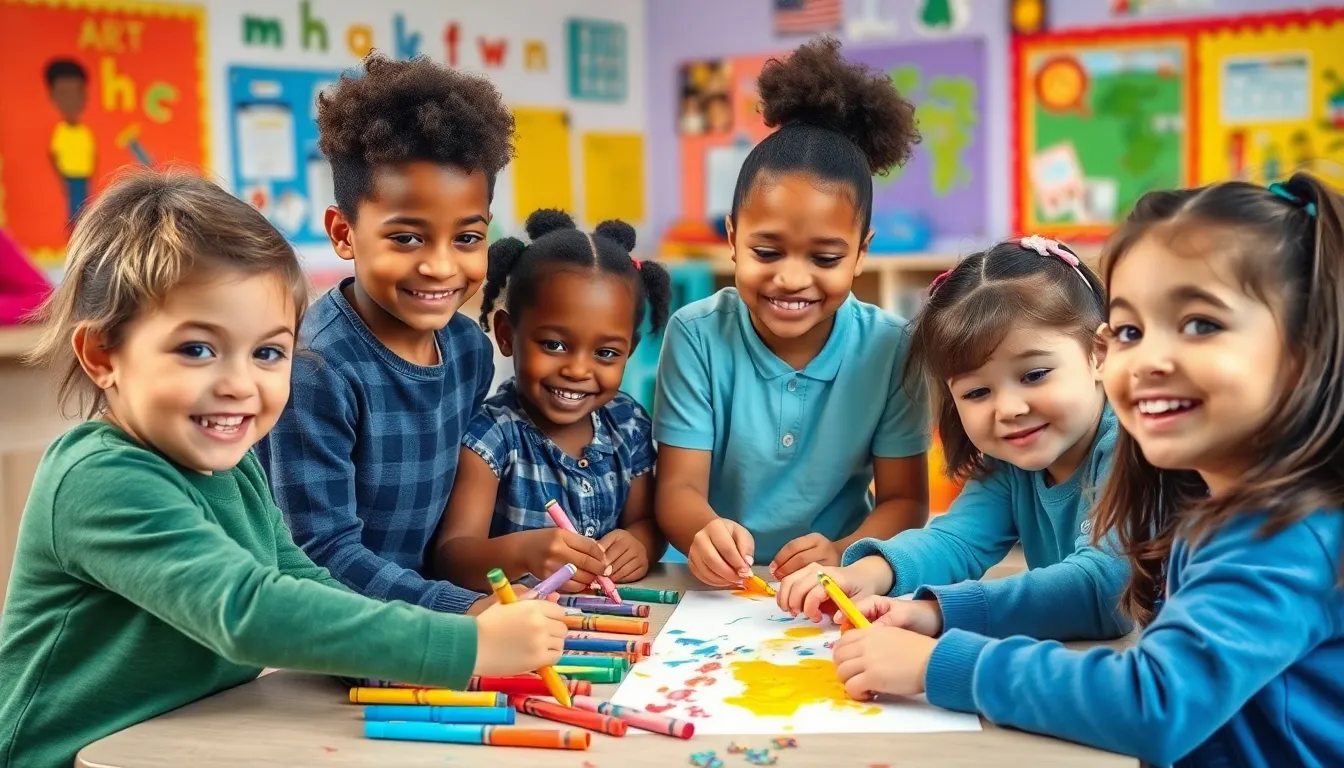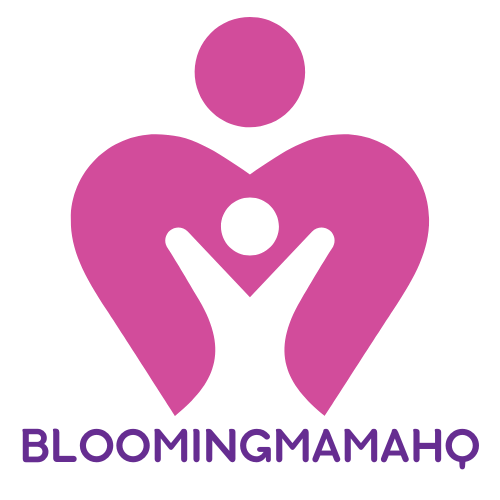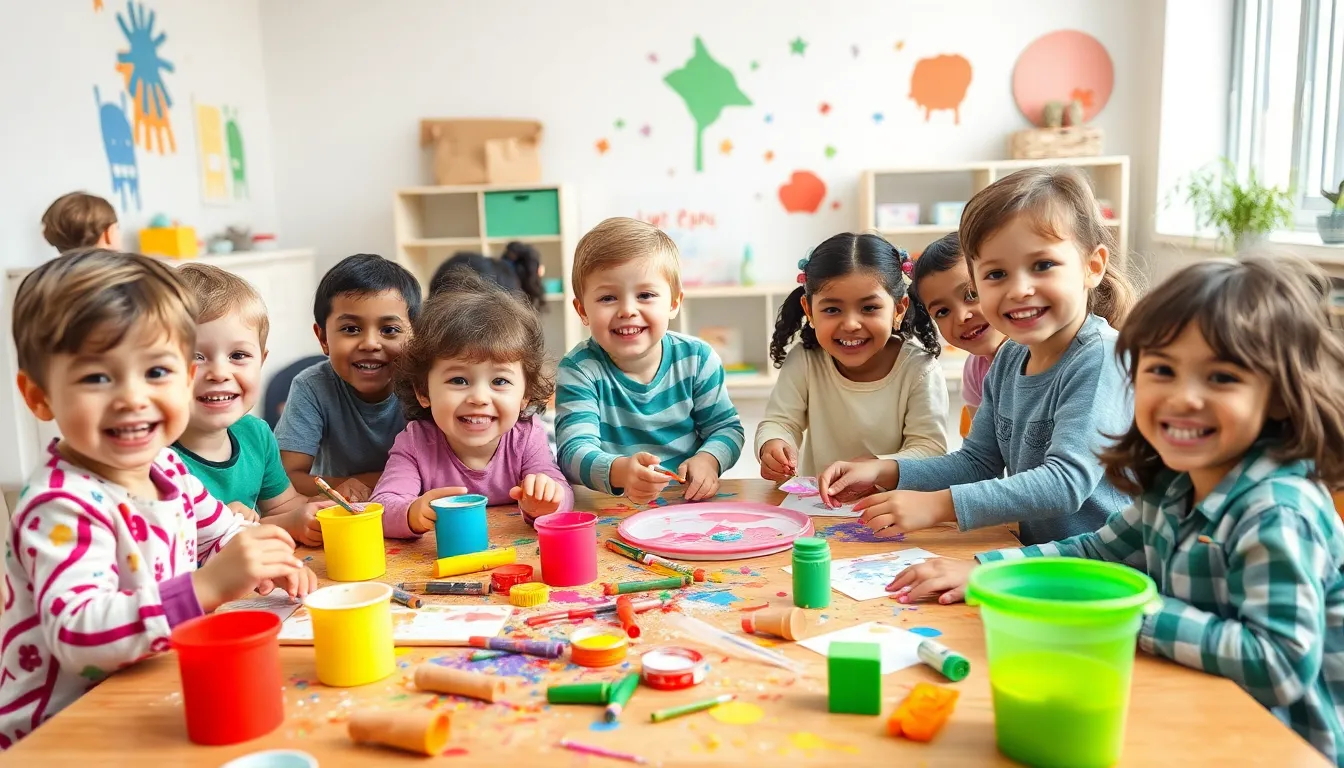When it comes to preschool learning activities, it’s all about making education as fun as a barrel of monkeys. Kids are naturally curious, and harnessing that energy with engaging activities can turn learning into an adventure. Forget about boring worksheets; it’s time to dive into a world where colors, shapes, and sounds come alive!
Imagine a classroom buzzing with laughter as little ones explore the wonders of counting with playful games or unleash their creativity through art projects. These activities not only spark joy but also lay the foundation for essential skills. So buckle up and get ready to discover a treasure trove of preschool activities that will have kids learning and giggling all at once. After all, who said education can’t be a blast?
Table of Contents
ToggleWhat Are Preschool Learning Activities?
Preschool learning activities encompass a range of interactive experiences designed to facilitate early childhood development. These activities prioritize enjoyment and engagement, leveraging children’s natural curiosity to foster learning. Playful games, creative art projects, and hands-on experiments form the core of these activities, encouraging exploration in a relaxed setting.
Manipulative play enhances fine motor skills and cognitive abilities. Building blocks, for example, allow children to practice problem-solving while supporting spatial reasoning. Creative art projects, such as finger painting or collage making, promote self-expression and enhance sensory development.
Group activities nurture social skills and teamwork. Circle time discussions encourage communication and listening, while collaborative games build patience and empathy. Role-playing scenarios help children understand social dynamics and expand their imaginative capacities.
Storytime sessions enhance language development and comprehension. Reading aloud with vivid illustrations captivates attention and inspires a love for books. Using props related to stories can further enrich the experience, making literary concepts more tangible.
Structured activities, like counting games or simple science experiments, provide foundational knowledge in math and science. These tasks develop critical thinking skills and introduce basic concepts in an enjoyable format.
Incorporating movement into preschool learning activities supports physical development. Dance, obstacle courses, and nature walks combine exercise with learning, aiding in gross motor skills enhancement. Immersive environments create a lively classroom atmosphere where early education thrives.
Benefits of Preschool Learning Activities

Engaging in preschool learning activities offers numerous advantages that foster child development.
Cognitive Development
Cognitive skills significantly benefit from playful learning. Engaging in interactive activities enhances problem-solving abilities and critical thinking. Through games, children learn to identify patterns, categorize objects, and understand basic math concepts. They develop language skills during storytime, expanding vocabulary and comprehension. Activities that involve hands-on experiences, like science experiments or art projects, encourage exploration and curiosity. Emphasis on these cognitive advancements lays a strong foundation for future academic success. Research shows that engaging preschoolers in these learning activities leads to better outcomes in literacy and numeracy skills.
Social Skills Enhancement
Social skills thrive in the collaborative environments of preschool activities. Children participate in group games, fostering teamwork and communication. Sharing resources encourages taking turns, a crucial aspect of social interaction. Engaging in role-playing scenarios allows kids to practice empathy and understand perspectives. Through collaborative work, they develop conflict resolution skills, learning to address issues constructively. This foundation of social learning proves essential as children transition to formal schooling, where cooperation becomes vital. Studies indicate that well-developed social skills contribute significantly to long-term academic and personal success.
Types of Preschool Learning Activities
Preschool learning activities encompass various engaging experiences designed to promote early childhood development.
Outdoor Activities
Outdoor activities provide opportunities for active learning. Kids explore nature through activities like scavenger hunts that develop observation skills. Structured games, such as tag, enhance physical fitness while encouraging teamwork. Free play lets children use their imaginations, fostering creativity and problem-solving skills. These experiences also enhance sensory development, as children interact with different textures and sounds in their environment.
Indoor Activities
Indoor activities create a stimulating environment for learning. Building blocks facilitate fine motor skills alongside spatial awareness as children create various structures. Puzzle-solving enhances critical thinking while promoting patience. Group activities, like circle time, encourage social interaction, helping kids learn to share and communicate effectively. Art corners allow for individual expression, where children explore colors and shapes while developing cognitive skills.
Creative Activities
Creative activities inspire self-expression and innovation. Craft projects, using diverse materials, encourage imaginative thinking. Musical games improve auditory skills and rhythm recognition, promoting cognitive development. Storytelling sessions not only boost vocabulary but also enhance listening comprehension. Dance activities provide a fun way to combine movement with creativity, ensuring children stay active while exploring their artistic sides.
Tips for Implementing Preschool Learning Activities
Implementing preschool learning activities effectively enhances children’s learning experiences. Engaging techniques and the incorporation of play can significantly boost interaction and retention.
Engaging Techniques
Utilize visual aids to capture attention during lessons. Storytelling techniques encourage imagination, making subjects memorable. Group discussions promote communication, helping children express their thoughts. Interactive games facilitate learning, combining movement with education. Timely feedback provides encouragement, reinforcing positive behavior and learning. Adjust activities based on children’s interests, enhancing their motivation to participate. Encourage exploration by allowing children to make choices in their learning activities.
Incorporating Play
Integrate play into everyday learning experiences. Use role-playing to teach social skills and problem-solving. Implement games that require teamwork, fostering collaboration among peers. Provide hands-on activities that stimulate senses, promoting active engagement. Incorporate rhythm and songs to enhance memory retention. Outdoor play offers physical benefits while supporting cognitive development. Design creative challenges that inspire imagination, ensuring learning remains fun and pertinent.
Engaging preschool learning activities play a vital role in shaping a child’s early development. By prioritizing fun and interaction, these activities not only enhance cognitive skills but also foster social connections among peers. The blend of play with education creates a dynamic learning environment that encourages curiosity and exploration.
As children participate in various hands-on experiences, they build essential skills that lay the groundwork for future academic success. Embracing creativity and movement in learning ensures that preschoolers remain excited about education. Ultimately, the right mix of activities can transform the learning journey into an adventure that supports holistic growth and development.



